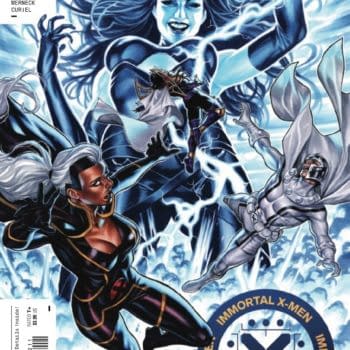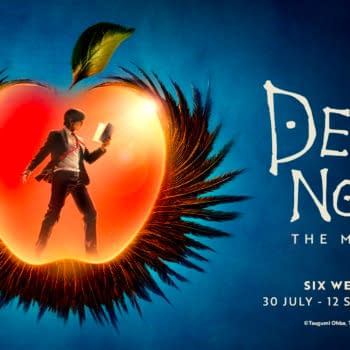A mysterious gangland murder brings out the worst in many people in power, and Newburn #7 is here to throw the plot twists at you fast and furious. When a
Posted in: Books, Pop Culture | Tagged: alisa perren, cully hamner, gregory steirer, The American Comic Book Industry and Hollywood
New Book Solves The Equation "Comics + Hollywood = $(?)"
With a surprisingly unique perspective and thorough academic rigor, a new book on the synergy between live-action adaptations and sequential art gives a timely and vital understanding of the mechanics behind the capes and masks. Fueled by the perspective of a former comics retailer and a media studies professor with close access to one of the industry's most influential artists, The American Comic Book Industry and Hollywood could likely join the seminal Scott McCloud book Understanding Comics as a primer on how the sausage is made.
One half of the team creating this work is Dr. Alisa Perren, an associate professor in the Department of Radio-TV-Film and Co-Director of the Center for Entertainment and Media Industries (CEMI) at the University of Texas at Austin. Her research and teaching interests include television studies, media industry studies, and US film and television history. She is also the partner of artist Cully Hamner, whose influence on comics includes designing the latest version of the Blue Beetle, a storied run as an original member of Atlanta's legendary Gaijin Studios and co-creator of Red, which ended up on the silver screen starring Bruce Willis.
The other part of this authorial duo is Gregory Steirer, associate professor of English and film studies at Dickinson College in Carlisle, Pennsylvania. He received a National Endowment for the Humanities Fellowship for 2017-2018 in support of his monograph on intellectual property law and the history of the narrative-based franchise. He was also the owner of Endicott, New York's own Centerfield Cards & Comics in the 1990s, so he has clearly seen things that might shock and amaze.
Together, the two of them use the lens of the comics crossover to open the door on how Hollywood affects comics in many areas: financial, hierarchical, critical, and more.
"I think it was a sign that Cully and I started to date the year before the first Iron Man movie came out, so clearly this book was meant to be," Perren joked."Seriously, though, through him, I met and got to know so many amazing comics professionals – artists, writers, editors, publishers, and more. I wanted to better understand how they saw their professions changing as Hollywood became more interested in comics IP."
"Both my co-author Greg and I were able to draw from our distinctive backgrounds and training as scholars to provide an overview of the film, TV, and comics industries in transition." Perren added: "We were also fortunate to be able to speak with a wide range of executive and creatives involved in translating comics – from The Walking Dead to Supergirl to Wynonna Earp – from page to screen. Our hope is that this book can give readers a fresh perspective on why and how Hollywood turned to both comics pros and IP."
"Alisa really has had a front-row seat to what happens when a comics creator gets something produced in Hollywood," said Hamner. "She was with me through the entire process of RED making the jump from comics to film. I'm not kidding; she heard every deal point, visited the set, met the people behind the movies, and went to both premieres with me. It lit a fire and set her on a whole path of discovery, and ultimately, she and Greg managed to present an impressively broad, intriguing, widescreen view of the subject. There are a lot of details in the book that surprised me, actually."
If you're looking for a compare and contrast between the Secret Wars of different generations or which Crisis had bigger stakes, this isn't that kind of work. From its first chapter …
"Readers will note that we devote very little attention here to narrative studies of either individual comic-book or film texts or to 'transmedia' universes … we have found in our research that narrative-based approaches to comics and comics-based texts often produce a slightly misleading picture of the industrial processes that determine how these texts are actually made. This finding is perhaps not surprising, as media industry studies as a field has, in recent decades, distanced itself from narrative-based approaches for just this reason."
With more than forty professional sources, some who spoke on condition of anonymity, The American Comic Book Industry and Hollywood delivers a focused analysis of the conditions on the ground that can be like tea leaves in showing what could happen moving forward.
The American Comic Book Industry and Hollywood goes on sale on July 1, 2021.
Stay up-to-date and support the site by following Bleeding Cool on Google News today!


















